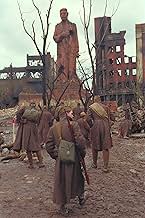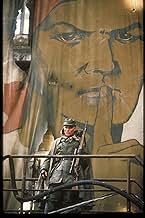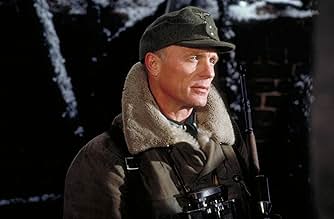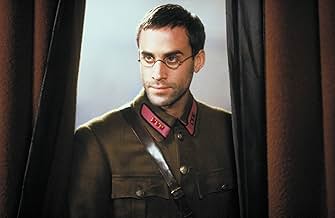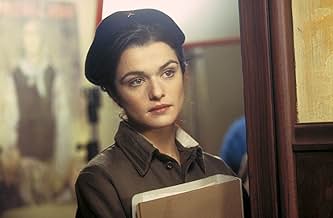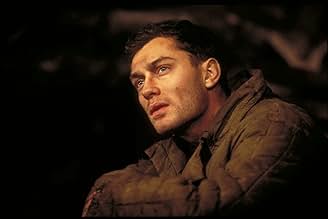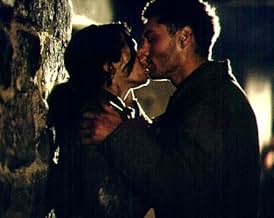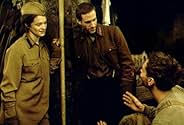A Russian and a German sniper play a game of cat-and-mouse during the Battle of Stalingrad.A Russian and a German sniper play a game of cat-and-mouse during the Battle of Stalingrad.A Russian and a German sniper play a game of cat-and-mouse during the Battle of Stalingrad.
- Director
- Writers
- Stars
- Awards
- 7 nominations total
Gabriel Thomson
- Sacha Filipov
- (as Gabriel Marshall-Thomson)
Hans-Martin Stier
- Red Army General
- (as Hans Martin Stier)
Clemens Schick
- German NCO
- (as Clemans Schick)
- Director
- Writers
- All cast & crew
- Production, box office & more at IMDbPro
Featured reviews
It's the fall of 1942. Vassili Zaitsev (Jude Law) grew up hunting with his father in the woods. He, Tania (Rachel Weisz) and countless other untrained recruits are brought up to the front at Stalingrad. He and Commisar Danilov (Joseph Fiennes) survive a suicidal charge. Vassili kills 5 Germans in the aftermath and Danilov writes about him. Nikita Khrushchev (Bob Hoskins) seizes the opportunity to make him a star. Opposing him is the aristocratic German sniper Major König (Ed Harris).
The opening is an amazing opera of mass destruction. Then it's a matter of a chess game. It's a fascinating cat and mouse game in the ruins of the city. I'm glad that nobody decided to talk in a fake Russian accent. That would be too distracting. This is a rare good American war movie not about Americans.
The opening is an amazing opera of mass destruction. Then it's a matter of a chess game. It's a fascinating cat and mouse game in the ruins of the city. I'm glad that nobody decided to talk in a fake Russian accent. That would be too distracting. This is a rare good American war movie not about Americans.
ENEMY AT THE GATES / (2001) *** (out of four)
By Blake French:
"Enemy At The Gates" takes place in 1942 and details a cat and mouse chase between two snipers. The mouse is a young Russian named Vassili Zaitsev (Jude Law), who arrives on the shores of the Volga River to defend Stalingrad, an important city in which the German's are attempting to capture. Zaitsev soon finds himself befriending a political officer named Danilov (Joseph Fiennes), who is impressed by the soldiers quick skills and decides to glorify him through the local press. Zaitsev becomes a political icon for the locals, giving them encouragement and increasing their hope for victory.
The cat is an opposing sniper named Major Koenig (Ed Harris), a famous sharpshooter called upon to kill Zaitsev. Koulikov (Ron Perlman), another talented sniper, is assigned to help Zaitsev in killing Koenig before the Major takes a victory shot. To further complicate matters, Zaitsev falls in love with another soldier, Tania (Rachel Weisz), whose parents were killed by the enemies, and wants to redeem their honor.
"Enemy At The Gates" certainly paints a vivid, graphic depiction of war. The atmosphere is unsettling and bleak, the characters are almost always dirty and sleepless, the fighting scenes consist of brief, short, instantaneous shots, but the sequences are fast-paced, genuine, and disturbing. The city looks battered and tormented. The dialogue goes hand and hand with the character's actions; the plot is challenging and the movie is focused, about something solid. In the sequences where Koenig and Zaitsev challenge one another, the tension is very effective. The movie tends to realize that, and concentrates a great deal of effort in making those scenes suspenseful and taut.
Joseph Fiennes plays a meek, nervous character and does a good job at bringing him to life believably. Jude Law, whose last work in "The Talented Mr. Ripley" provides a tough act to follow, accomplishes great things with a determined and assiduous character. Ed Harris is the standout actor here, in a harrowing, steadfast, juicy performance. Rachel Weisz cannot do a whole lot with her character, however. She often feels strained and contrived.
"Enemy At The Gates" tries hard to express the subject of the media's influence in our culture. If the film, co-written and directed by Jean-Jaques Annaud ("Seven Years in Tibet"), would have stayed on that concept, it would have been a whole lot better. The romance between Zaitsev and Tania is kind of unnecessary, and I am not sure if the sex scene is obligatory or advances their relationship. This love side story lacks passion; a lot of it feels mechanical and routine. "Enemy At The Gates" is still a consistently intriguing war film-rare because it does not involve Americans. While we are never really concerned about the outcome of the actual war, nor do we entirely care about several aspects of the main characters, there are many good scenes of suspense, and the overall mood of the movie is effective. "Enemy at the Gates" is worth seeing if it sounds interesting to you.
By Blake French:
"Enemy At The Gates" takes place in 1942 and details a cat and mouse chase between two snipers. The mouse is a young Russian named Vassili Zaitsev (Jude Law), who arrives on the shores of the Volga River to defend Stalingrad, an important city in which the German's are attempting to capture. Zaitsev soon finds himself befriending a political officer named Danilov (Joseph Fiennes), who is impressed by the soldiers quick skills and decides to glorify him through the local press. Zaitsev becomes a political icon for the locals, giving them encouragement and increasing their hope for victory.
The cat is an opposing sniper named Major Koenig (Ed Harris), a famous sharpshooter called upon to kill Zaitsev. Koulikov (Ron Perlman), another talented sniper, is assigned to help Zaitsev in killing Koenig before the Major takes a victory shot. To further complicate matters, Zaitsev falls in love with another soldier, Tania (Rachel Weisz), whose parents were killed by the enemies, and wants to redeem their honor.
"Enemy At The Gates" certainly paints a vivid, graphic depiction of war. The atmosphere is unsettling and bleak, the characters are almost always dirty and sleepless, the fighting scenes consist of brief, short, instantaneous shots, but the sequences are fast-paced, genuine, and disturbing. The city looks battered and tormented. The dialogue goes hand and hand with the character's actions; the plot is challenging and the movie is focused, about something solid. In the sequences where Koenig and Zaitsev challenge one another, the tension is very effective. The movie tends to realize that, and concentrates a great deal of effort in making those scenes suspenseful and taut.
Joseph Fiennes plays a meek, nervous character and does a good job at bringing him to life believably. Jude Law, whose last work in "The Talented Mr. Ripley" provides a tough act to follow, accomplishes great things with a determined and assiduous character. Ed Harris is the standout actor here, in a harrowing, steadfast, juicy performance. Rachel Weisz cannot do a whole lot with her character, however. She often feels strained and contrived.
"Enemy At The Gates" tries hard to express the subject of the media's influence in our culture. If the film, co-written and directed by Jean-Jaques Annaud ("Seven Years in Tibet"), would have stayed on that concept, it would have been a whole lot better. The romance between Zaitsev and Tania is kind of unnecessary, and I am not sure if the sex scene is obligatory or advances their relationship. This love side story lacks passion; a lot of it feels mechanical and routine. "Enemy At The Gates" is still a consistently intriguing war film-rare because it does not involve Americans. While we are never really concerned about the outcome of the actual war, nor do we entirely care about several aspects of the main characters, there are many good scenes of suspense, and the overall mood of the movie is effective. "Enemy at the Gates" is worth seeing if it sounds interesting to you.
After watching such films as "Saving Private Ryan" and "Patton;" I have come to appreciate war films. For this reason, I decided to see the latest war film, "Enemy At The Gates."
"Enemy At The Gates" may be one of the best war films I have seen since "Saving Private Ryan" because it is executed perfectly. With incredible performances, script and the impact I felt; "Enemy At The Gates" sets the tone as the first great war film of the 22nd century. This film can be served as the appetizer to the main course coming out soon, "Pearl Harbor."
Jude Law, Joseph Feinnes, Rachel Weisz, Ed Harris and Bob Hoskins come together to re-visit the Battle of Stalingrad in 1942. The best thing about seeing each one of the actors perform was they all gave 100 percent effort to make the film as real as possible; they did an excellent job. Fiennes, Weisz and Hoskins were the icing to a cake that was delicious from the start.
The highlights of "Enemy At The Gates" always came when Law and Harris were on screen because they played excellent psychological mind games with one another to win; furthermore, it was like watching master chess players playing for the grand prize. It was also enjoyable to see the strategies and tactics each would use to out-maneuver the other.
"Enemy At The Gates" drew me with its many action sequences similar to those in "Saving Priate Ryan." Also, the love triangle between the three main leads was interesting to watch and see how it would unfold. I felt like I was in the movie because the writer did an excellent job at making me feel exactly what they felt and experience what they were going through.
There is no rule that states dialogue is needed for a successful film. While "Enemy At The Gates" has dialogue, the scenes that have none stand out in my mind the most because we see close-ups of both snipers and the expressions on their faces. This is incredible to me because the intensity shown on their faces speaks volumes about what the movie is really about.
This may not be the best war film ever made but with two of the brightest young stars on the rise, an actress that is here to stay and a veteran that continues to turn in knock-out performances, "Enemy At The Gates" will be remembered for a long time.
"Enemy At The Gates" may be one of the best war films I have seen since "Saving Private Ryan" because it is executed perfectly. With incredible performances, script and the impact I felt; "Enemy At The Gates" sets the tone as the first great war film of the 22nd century. This film can be served as the appetizer to the main course coming out soon, "Pearl Harbor."
Jude Law, Joseph Feinnes, Rachel Weisz, Ed Harris and Bob Hoskins come together to re-visit the Battle of Stalingrad in 1942. The best thing about seeing each one of the actors perform was they all gave 100 percent effort to make the film as real as possible; they did an excellent job. Fiennes, Weisz and Hoskins were the icing to a cake that was delicious from the start.
The highlights of "Enemy At The Gates" always came when Law and Harris were on screen because they played excellent psychological mind games with one another to win; furthermore, it was like watching master chess players playing for the grand prize. It was also enjoyable to see the strategies and tactics each would use to out-maneuver the other.
"Enemy At The Gates" drew me with its many action sequences similar to those in "Saving Priate Ryan." Also, the love triangle between the three main leads was interesting to watch and see how it would unfold. I felt like I was in the movie because the writer did an excellent job at making me feel exactly what they felt and experience what they were going through.
There is no rule that states dialogue is needed for a successful film. While "Enemy At The Gates" has dialogue, the scenes that have none stand out in my mind the most because we see close-ups of both snipers and the expressions on their faces. This is incredible to me because the intensity shown on their faces speaks volumes about what the movie is really about.
This may not be the best war film ever made but with two of the brightest young stars on the rise, an actress that is here to stay and a veteran that continues to turn in knock-out performances, "Enemy At The Gates" will be remembered for a long time.
Not a bad war film - but only if you know nothing about the actual battle. The film makers are entitled to take artistic license, and although some historical characters are present in the film, it never even comes close to portraying the battle as it was. Much of the fighting lacks reality and the computer generated Stuka dive bombers attacking reinforcements crossing the Volga are totally unrealistic.
The film takes a quick peek at several themes of the actual battle but explores none - including the character of Zaitsev himself, whose role in the battle was quite different from Law's character. It is worth mentioning that several other Russian snipers, in Stalingrad and elsewhere, killed many more Germans than Zaitsev. It is also amazing how many people believe that Konig is based on a real character called Hartmann, A good tale, but untrue. Still, its a decent film, but the real Stalingard epic has yet to be made
The film takes a quick peek at several themes of the actual battle but explores none - including the character of Zaitsev himself, whose role in the battle was quite different from Law's character. It is worth mentioning that several other Russian snipers, in Stalingrad and elsewhere, killed many more Germans than Zaitsev. It is also amazing how many people believe that Konig is based on a real character called Hartmann, A good tale, but untrue. Still, its a decent film, but the real Stalingard epic has yet to be made
First of all, I think it was a mistake for the screenwriters to pick and choose such a big event in the history of WWII, a turning point so to speak, only to have it placed as a background, to something so much less significant, a duel between two snipers. If one has never read anything historical or seen any chronological movies about battle of Stalingrad, or any other battle for that matter before seeing this movie, one might even wonder, how did Russians win the war at all? With one rifle per four hands? Against tanks? And aircraft? And heavy artillery? You know there's only so much even a drunken Russian can do with his ½ of a rifle. I see all these peoples' comments complaining that the main characters' accents were too British or too American and that that spoiled the true Russian Character, however the Hollywood makers portray that to be. But, being Russian myself, I saw nothing in the movie, at least on the Russian side, that resembled any truth to even how people spoke to each other, how they interacted with each other. They just didn't seem Russian to me, and it didn't matter what accents they used. These characters were biased cardboard characters, speaking cardboard character lines, and acting, well, cardboard-like. In the opening scenes of the movie they show a bunch of unarmed people thrown into battle only to be massacred by well armed Germans. That's a crock of sh*t, pardon my Russian. Basically by 1942, Hitler's army was fighting on two fronts, and it was very, very tired. Both sides were. Both sides were running out of people and supplies. Mostly, Battle of Stalingrad was a two-steps-forward-one-step-back kind of war. People charging and taking over some useless strategic point and then being thrown back, and then charging again. It was a battle to see who had a bigger stamina, because both sides were low in numbers. But it was also a battle involving tanks, artillery, and planes on BOTH sides. In the movie they omitted that, showing us diving Stukas, and yet surprisingly, no anti-aircraft guns firing at them, no Russian planes in the sky, just two soldiers armed with one rifle. Bullsh*t. No number of Vasiliy Zaycevs or Tatyana Whoevers would be able to stand off, and more even, reverse the tide of war against Germans, without having, basically an equally, if not better, equipped army at their side. If you look at the numbers, about 250,000 German and about 100,000 Russian soldiers lost their lives over Stalingrad. Well from the movie it might seem the opposite. Plus the whole mood of the movie. Russian soldiers, seemed no different from prisoners, defending Stalingrad only because of the muzzles pointed at their backs. But actually, believe it or not, many of these people were defending their motherland, their wives, daughters, sons, etc. and they were doing it not because they were to be shot otherwise, but because they loved their country and believed in its future. True, there were special NKVD units that were ordered to fire on retreating soldiers. But there was no other way, at that point. If Stalingrad would've fallen, that would greatly demoralize an entire Red Army, and cause an even greater loss of life. But by no means were soldiers thrown into battle, half-armed into their certain death. That would just be pointless, even for ruthless Russian Generals. Plus when they showed Kruschev commanding the front, I fell off my seat laughing. I can go on and on, and this would be a never-ending story, except that I don't want it to be as boring and as never-ending as the script for Enemy at the gates. Advice for people who like a little reality in their movies, don't see it. It sucks. I try to picture Private Ryan done by the same director. It just wouldn't be Private Ryan, but some stupid unrealistic war flick, sort of like U-571.
Did you know
- GoofsIn the scene where Vassili is lighting the cigarette butt he picked up from the German sniper, it's apparent by the flame he uses a butane lighter. Butane lighters were not invented until the 1950's.
- Quotes
Commisar Danilov: I've been such a fool, Vassili. Man will always be a man. There is no new man. We tried so hard to create a society that was equal, where there'd be nothing to envy your neighbour. But there's always something to envy. A smile, a friendship, something you don't have and want to appropriate. In this world, even a Soviet one, there will always be rich and poor. Rich in gifts, poor in gifts. Rich in love, poor in love.
- Crazy creditsThe end credits are slanted and curved.
- SoundtracksLa Chanson des Artilleurs
Music by Tikhon Khrennikov
Lyrics by Viktor Gusev
(C) Musikvertag Hans Sikorski, Hamburg
Performed by The Red Army Choir (as Les Choers De L'Armee Rouge)
Courtesy of 7 Productions, Paris
- How long is Enemy at the Gates?Powered by Alexa
Details
- Release date
- Countries of origin
- Official sites
- Languages
- Also known as
- Stalingrad - Enemy at the Gates
- Filming locations
- Production companies
- See more company credits at IMDbPro
Box office
- Budget
- $68,000,000 (estimated)
- Gross US & Canada
- $51,401,758
- Opening weekend US & Canada
- $13,810,266
- Mar 18, 2001
- Gross worldwide
- $96,976,270
- Runtime
- 2h 11m(131 min)
- Color
- Sound mix
- Aspect ratio
- 2.35 : 1
Contribute to this page
Suggest an edit or add missing content


